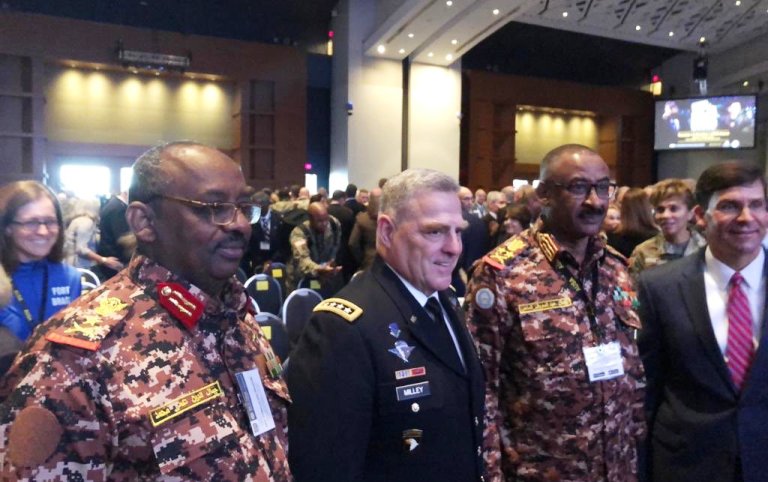Washington conference designates rebel groups as source of terrorism: military chief

October 19, 2018 (KHARTOUM) Sudanese Army’s Chief of General Staff Kamal Abdel-Marouf said his country managed to include the armed rebel groups as a source of terrorism and threat to regional peace and security at the Counter Violent Extremist Organizations conference.
Abdel-Marouf was among chiefs of staffs from 83 nations who participated in the 3rd Counter Violent Extremist Organizations conference organized by the U.S. Department of Defence from 15 to 17 October in Washington.
In press statements at Khartoum airport upon his arrival from Washington, Abdel-Marouf said the conference offered a good opportunity to show Sudan’s local and regional efforts to counter terrorism and violent extremism.
Abdel-Marouf described his visit to Washington as historic, saying it was the first of its kind since 30 years.
He pointed out that they presented Sudan’s unique experience in adopting intellectual dialogue as a means to counter extremism, saying the idea has won approval of all participants in the conference.
Abdel-Marouf added his delegation also pointed to Sudan’s experience of establishing joint border forces with neighbouring countries to enhance security and combat cross-border crime, human trafficking, illegal migration and terrorism.
“We managed to include the armed rebel movements as a source of terrorism and threat to regional peace and security in the recommendations of the conference,” he said
In April 2017, Sudan participated for the first time in the meeting of the United States Africa Command known as “AFRICOM”. At the time, the Sudanese army Chief of General Staff Lt. Gen. Emad al-Din Mustafa Adawi took part in a meeting of AFRICOM chiefs of general staff in Stuttgart, Germany.
On Wednesday 19 September, the U.S. State Department released its report on terrorism which has kept Sudan on the list of states sponsoring terrorism. However, Washington said Khartoum remains a partner in the counter-terrorism.
The east African nation was placed on the U.S. terrorism list in 1993 over allegations it was harbouring Islamist militants working against regional and international targets.
U.S. HAILS SUDAN’S ECONOMIC MEASURES
Meanwhile, the official news agency SUNA has quoted the State Minister of Finance Muslim al-Amir as saying the U.S. Deputy Assistant Secretary of Treasury Eric Meyer has praised Sudan’s recent economic reform policies.
Al-Amir met the U.S. official on the sidelines of the annual meetings of the IMF-World Bank which recently took place in Bali, Indonesia.
According to the agency, al-Amir renewed Sudan’s commitment to dialogue as a means to achieve the joint interests of both nations.
The meeting stressed the need to exert further joint efforts to build upon the positive outcome of the first phase of dialogue between the two countries.
During the meeting, al-Amir called on the U.S. to provide technical assistance to support Sudan’s economic reforms and improve the business environment in order to prepare the country for the post-normalization era.
In October 2017, Washington decided to lift economic sanctions on Sudan in line with a five-track framework reached by the countries in December 2016. Khartoum, accordingly, authorized humanitarian access to civilians in Darfur and unilaterally declared a cessation of hostilities in Darfur, the Blue Nile and South Kordofan states.
The two countries agreed to resume talks on the normalization of bilateral talks and the lift of remaining sanctions particularly its designation as a state sponsor of terrorist groups.
Last month, Sudan’s Foreign Minister El-Dirdeiry Mohamed Ahmed met the U.S. Deputy Secretary of State John J. Sullivan in New York on the sidelines of the 73rd session of the United Nations General Assembly.
In a statement issued after the meeting, Sudan’s Foreign Ministry said the two sides reached an agreement on the launch of the second phase of dialogue between the two countries soon.
(ST)
